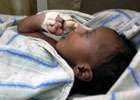Immunizing at birth is safe and effective against severe pneumococcal disease

(Medical Xpress) -- Vaccinating children against the pneumococcus at birth is safe and primes the immune system against later infection, according to research published in the journal Clinical Infectious Diseases.
The study, carried out by researchers at the KEMRI-Wellcome Trust Research Programme in Kilifi, Kenya, working in collaboration with scientists at the UCL Institute of Child Health, indicates that immunising children within the first three days of life does not negatively affect their responses to a second or third dose of vaccine.
Babies born to HIV-negative mothers were given 7-valent pneumococcal conjugate vaccine at birth and then again at ten and 14 weeks of age. A second group received the vaccine at six, ten and 14 weeks, one of the schedules recommended by the World Health Organization (WHO).
The vaccine was found to be equally safe when administered to both groups. By 18 weeks the vaccine had induced a protective immune response in around nine out of ten infants in both groups. The researchers tested immune memory by giving a 'booster' vaccine at 36 weeks and found vigorous responses to the booster in both groups, indicating that inability to respond to a second or third dose of the vaccine (immune tolerance), a potential hazard of newborn vaccination, was not a problem in either group.
Pneumococcus was estimated to cause 14.5 million episodes of illness and 826 000 deaths in children under the age of 5 years worldwide in the year 2000. The bacterium can cause illnesses including bacterial pneumonia in the lungs, bacteraemia (infection of the blood) and meningitis.
More than half of these deaths occurred in Africa. In Kenya, the disease is common in toddlers aged under two years; 15 per cent of these disease episodes occur in the first two months of life, before babies are due to receive the first dose of the vaccine.
"The Kenya expanded immunisation programme has brought about huge health benefits for children in Kenya," explains Professor Fred Were, a neonatologist and National Chairman of the Kenya Paediatric Association. "However, the less-than-a-month-old babies remain the most at-risk population for many bacterial infections. This research shows that, in principle, we may be able to reach them earlier with an effective vaccine against pneumococcal disease."
Dr. Anthony Scott, a researcher with the KEMRI-Wellcome Trust Research Programme, adds: "While the results of this study are very encouraging, further research is required to establish whether the schedule negatively affects responses to other routine childhood vaccines and to explore whether the second and/or third doses can be delivered earlier."
More information: Scott JAG et al. Pneumococcal conjugate vaccine given shortly after birth stimulates effective antibody concentrations and primes immunological memory for sustained infant protection. Clin Infect Dis 2011 24 August [epub].














